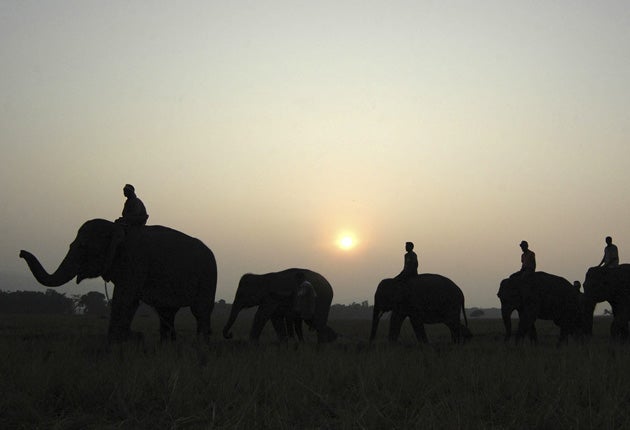Indian police thwart elephant smuggling ring

Your support helps us to tell the story
From reproductive rights to climate change to Big Tech, The Independent is on the ground when the story is developing. Whether it's investigating the financials of Elon Musk's pro-Trump PAC or producing our latest documentary, 'The A Word', which shines a light on the American women fighting for reproductive rights, we know how important it is to parse out the facts from the messaging.
At such a critical moment in US history, we need reporters on the ground. Your donation allows us to keep sending journalists to speak to both sides of the story.
The Independent is trusted by Americans across the entire political spectrum. And unlike many other quality news outlets, we choose not to lock Americans out of our reporting and analysis with paywalls. We believe quality journalism should be available to everyone, paid for by those who can afford it.
Your support makes all the difference.Indian police have busted what they say is a transnational elephant-smuggling ring – highlighting a new threat to one of the country's most iconic animals. Officers in the north-eastern state of Assam said they arrested five people and recovered three elephants – two of them calves – that were destined to be illegally trucked across the country and even abroad.
Police said that documents gathered during the raid suggested the ring had been responsible for smuggling almost 100 elephants over the past five years. The elephants can reportedly sell for up to £50,000.
Elephants are protected under a 1972 law and the sale of the animals is illegal. Even transporting one across state boundaries requires an extensive documentation process and the permission of the chief wildlife officer.
But reports suggest that, having been captured, drugged and even whipped into submission, elephants are trafficked in much the same way as people, with fake documents being prepared and bribes being paid to officials.
Police in Assam carried out a three-day operation, which concluded with the arrest of the five suspected smugglers, after being contacted by a local wildlife protection group, the Green Heart Nature Club.
The group's director, Bablu Dey, said: "Over five years, this group is believed to be responsible for smuggling at least 92 elephants. These animals are captured from across the north-east and then brought to Assam. We think many elephants are being held in remote villages before being smuggled." Mr Dey added that the illegal trade was driven largely by wealthy businessmen in states such as Uttar Pradesh and Bihar who wanted to keep the animals as status symbols. He said there was evidence the animals were also smuggled outside of India, with some being trucked into Nepal and Burma.
The superintendent of police in the western Assamese district of Kokrajhar, P K Dutta, said he believed the ring may have been trying to smuggle as many as 10 elephants when it was caught. It is not known what happened to the seven animals not recovered.
He told the Associated Press that smugglers regularly captured wild elephants from the forests of Assam, trained them for a year or two, and then claimed they were the offspring of the state's many domestic elephants.
Earlier this year, the Indian government acknowledged that with many conservation efforts focusing on the highly threatened tiger, the plight of India's elephants was often overlooked. To remedy this, the authorities announced in September that they planned to make the elephant a so-called national heritage animal and to afford it the same level of protection as that received by the tiger.
"We need to give the same degree of importance to the elephant as is given to the tiger to protect the big animal," said the Environment Minister, Jairam Ramesh.
It is estimated that there are 26,000 Asian elephants in India, of which 3,500 are working animals. While the total has not experienced the sort of drastic decline undergone by the tiger, the gender ratio is badly skewed and in some areas there is just one male elephant for 100 females.
Join our commenting forum
Join thought-provoking conversations, follow other Independent readers and see their replies
Comments